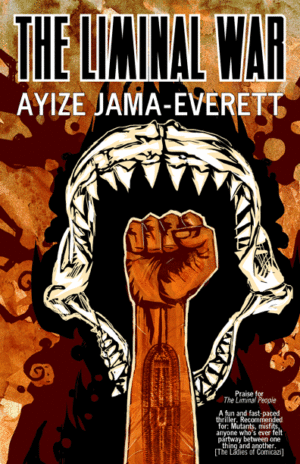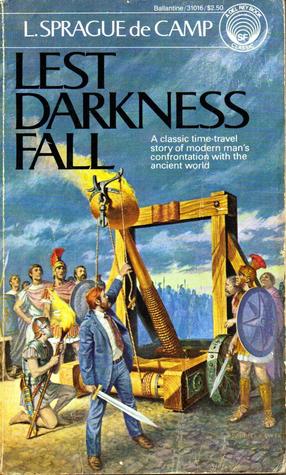Review: The Liminal War by Ayize Jama-Everett

Earlier this month on The World in the Satin Bag, Shaun Duke posted on his increasing weariness of long novels, particularly those over 500 pages. I personally don’t mind a hefty volume, particularly in epic fantasy where simply being immersed in the world (even its bloat) is just as enjoyable as the story itself. But, I get his frustration. Most books don’t need such length. A compact novel can pack a satisfying spectrum of literary punches without demanding an epoch of reader commitment. Ayize Jama-Everett’s The Liminal People had just this sort of effect on me with its mere 190 pages. Originally published by Jama-Everett in 2009 and subsequently reprinted by Small Beer Press, the novel shares elements of pulp noir and Octavia Butler’s Patternmaster series. The sequel, The Liminal War, is newly released at a similarly slender 224 pages.
Short and Sublime: March 2015 Round-Up
March has been a month of unusual settings, stories of alienation and loss, and meditations on the nature of time. Tade Thompson’s “The Monkey House” (Omenana #2), dystopian horror, is a story about what it means to be trapped inside a system, and the horrors one must overlook to be a part of that system; what happens when the ability to ignore horrors both natural and fantastical is seized from you and you alone? The protagonist is an unreliable narrator — or is he far more reliable as a narrator than the characters that surround him? — and holds a banal job as a paper-pusher with an insidiously creepy company whose purpose is obscured. This dystopia is set not in the future but in the eighties and follows the Orwellian tradition while being rather Kafkaesque, but adds enough facets, from dark fantasy elements to the chronic illness of the protagonist, to create something entirely new.
Mining the Genre Asteroid: Lest Darkness Fall by L. Sprague De Camp

In late 1930’s Rome, American archaeologist Martin Padway is having a holiday from his dig in Lebanon. Over dinner with his Italian friend Tancredi, a discussion of the nature of time and how a man might change the web of time becomes of eminently practical use when, a few hours later while studying the Pantheon, Martin finds himself cast back in time, to 6th Century Rome. In 535 AD Rome, The Roman Empire is a half century dead, in the West anyway. The Gothic Kingdom rules Rome and Italy. The Byzantines lurk to the East, dreaming of reconquering Italy for the Eastern Roman Empire. Martin himself is a stranger in a strange land, of competing Christian sects and ambitious nobles. Its going to take all of Martin’s wits to not only survive in an alien country, but to forge an even grander scheme. You see, at the cusp of the long slide after the fall of the Western Roman Empire, Martin realizes he is at an important moment of history, and as per his old friend, might be able to tackle the greatest challenge of all: To keep the Dark Ages from occurring. Lest Darkness Fall is a classic time travel story by L. Sprague De Camp. In six decades of writing, L. Sprague De Camp, separately and in collaboration, wrote over 100 books and numerous stories. From straight historical novels like Dragon at the Ishtar Gate to time travel stories like Lest Darkness Fall to reconstituting Burroughs like Sword and Planet stories with the Viagens Interplantarias series, De Camp was a seminal figure of early science fiction and fantasy who quietly but inexorably influenced generations of contemporaries and successors. While the conceit and methodology of sending Padway into the past is clearly just a literary device, once Padway finds himself in Rome, the novel goes into a “hard alternate history” sort of mode. No more fantastic elements. Padway struggles with the language; his Latin is rusty, and it gives De Camp a
Mining the Genre Asteroid: The Big Time by Fritz Leiber

Mining the Genre Asteroid is Paul Weimer’s look at the history of the science fiction and fantasy field, bringing to light important, interesting and entertaining books from science fiction and fantasy’s past to you. The Snakes and the Spiders continually alter and change history in an unclear conflict in order to control the flow of human history. Soldiers from ghostly timelines that have been destroyed are recruited to change history again and again until they make the history where one of these two forces will be triumphant. Russian soldiers from a Czarist American Empire can fight alongside warriors from the Khanate of Spain and Confederate soldiers from World War II. All of them were snatched up at the time of their death, and now fight for a new purpose. Help the Russians defeat Napoleon’s Grand Army. Aid the Persians at Marathon to defeat those perfidious Greeks. Push the results of a battle between the Indian Malwa Empire and the Chinese Sui Dynasty. Change the timeline again and again, everywhere, to win once and for all and with the mass of humanity none the wiser. And other species, too, far-future Venusians and far-past inhabitants of the Moon also play roles in changing history. Between battles in The Change War, though, soldiers need a location outside of space and time, unaffected by what the War does, to recuperate and prepare themselves for the next conflict. The Place is such a location for soldiers on the side of The Spiders. A motley set of warriors from very different original backgrounds are currently recovering there. There’s drink, there’s companionship of the opposite sex, there is healing, there is brief rest. However, all is not placid in The Place. These very different warriors do not always get along very well. Old grudges from now destroyed countries and timelines put those in The Place at odds with each other. There may be one of those sneaky Snake spies among the staff or the warriors in The Place. Add in a locked room mystery and (most ironically) a race against time before The Place and all in it is destroyed. I present to you The Big Time. I could and eventually will spend a month of columns on Fritz Leiber’s wide oeuvre of work. While best known and best remembered for his sword and sorcery in Fafhrd and the Grey Mouser, his reach extends much farther. Leiber’s influence ranges from literary criticism of H.P. Lovecraft, to proto-urban fantasy, and his science fiction stories. The influence of Leiber on multiple strands of science fiction and fantasy cannot be underestimated. Fritz Leiber was the child of two Shakespearean actors. One can think of The Big Time as his attempt to do a Shakespeare play as a novel. While the subject matter does not sound immediately Shakespearean, the setup and style definitely are. The Place is an enclosed, closed space, containing a limited set of characters, allusions and references that sketch out and imply a world far beyond the space that we actually see. One can think of it as a large theater (and the dimensions of the Place are, roughly, that of a large theater house). The novel is heavy on dialogue and a lot of wordplay, and short on action. There is even a character from the ancient past who only speaks in meter. Another character is a contemporary of Shakespeare’s, and knew him. I am not aware of a theatrical adaptation of The Big Time, but I would not be surprised if someone tried it. And what characters these are. Drawn from timelines and worlds long gone, the characters are complicated, damaged, broken, and conflicted. The narrator, Greta, killed in a Nazi invasion of Chicago in one timeline falls into a fraught, violent, complicated relationship with a Nazi officer who died in a battle in Norway in a different timeline. Or at least this version of him, saved by the Spiders for The Change War, died there. Doppelgangers and doubles of the soldiers and staff might and do exist out there. There is plenty of alternate history and time travel stories written since Leiber’s of course. The Big Time. But even today, it’s an alternate history and time travel novel that few have dared to imitate (I can think of only a bare handful of examples). I first read The Big Time at the height of my fascination with alternate history and found it to be sui generis. Leiber thought about writing a sequel, but sadly did not do so before his death. However, there are a few Change War short stories out there I have not yet managed to track down and read. Having entered the Public Domain, The Big Time is widely available, including most recently in the Gary K Wolfe edited LOA (Library of America) American Science Fiction: Nine Classic Novels of the 1950s box set. If the aforementioned box set is too expensive, Project Gutenberg has a decently edited free edition for you to download and read. If you have any interest in Leiber’s work, or Alternate History, I encourage you to do so.
149. Lauren Beukes (a.k.a. the Travel Ninja) — The Shining Girls (An Interview)

http://media.blubrry.com/skiffyandfanty/dts.podtrac.com/redirect.mp3/archive.org/download/SandFEpisode149InterviewWLaurenBeukes/SandF%20–%20Episode%20149%20–%20Interview%20w%20Lauren%20Beukes.mp3Podcast: Play in new window | DownloadSubscribe: Apple Podcasts | Spotify | Android | iHeartRadio | Podchaser | Podcast Index | Email | TuneIn | Deezer | RSSTime travel, murderers, and American pastimes, oh my! After one heck of an exciting year of bidding wars and writing, Lauren Beukes returns to the show to talk about her new novel, The Shining Girls. We talk about serial killers, her research into American history, time travel, and so much more! We hope you enjoy the episode! (Don’t forget to check out our interview with Lauren for her novel, Zoo City, here.) Note: If you have iTunes and like this show, please give us a review on our iTunes page, or feel free to email us with your thoughts about the show! Here’s the episode (show notes are below): Episode 149 — Download (MP3) Intro and Discussion (0:00 – 1:04:05) Lauren’s Website Lauren’s Twitter Lauren’s Tour Schedule The Shining Girls TV Show Announcement! Lauren’s Big Idea over at Whatever (Scalzi’s Blog) Check out Lauren’s books! They are awesome! You can also support this podcast by signing up for a one month free trial at Audible. Doing so helps us, gives you a change to try out Audible’s service, and brings joy to everyone. Our new intro music is “Time Flux” by Revolution Void (CC BY 3.0). That’s all, folks! Thanks for listening. See you next week.

